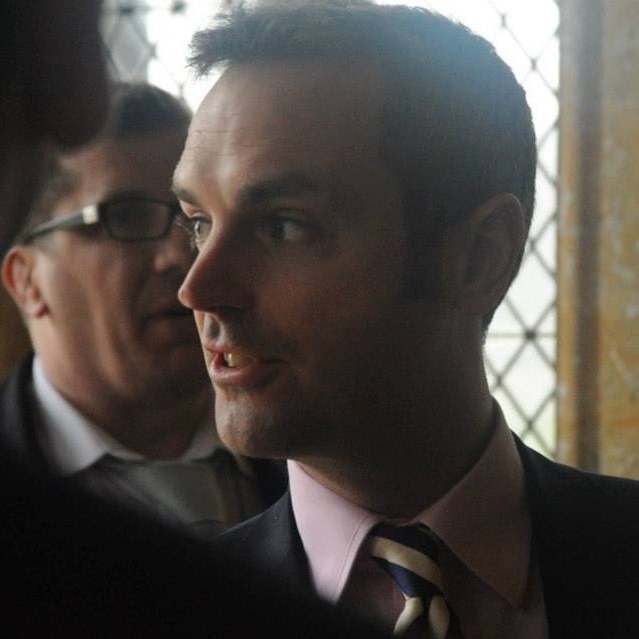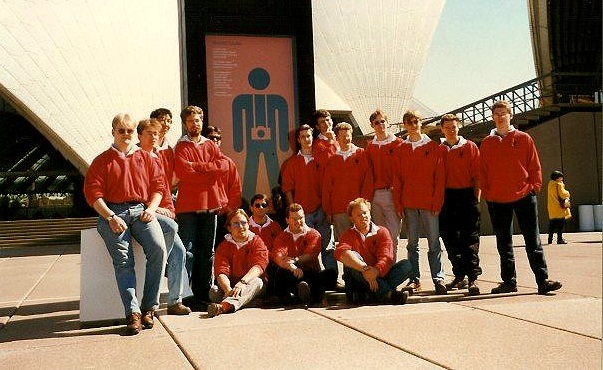Ed Hossack (1994) was a choral scholar and read for an undergraduate degree in English at St John’s. He has had a varied career working as a CEO, leader and consultant in the arts and third sectors working with internationally acclaimed orchestras, opera and dance companies.
Please tell us a little about your background and how you first got in to working in the arts sector.
A great deal of my time at St John’s was spent singing in the Choir and with the Gentlemen of St John’s. Much, possibly too much, of the rest of my time was spent managing the Gents and other music societies. With a degree in English, I had the briefest of stints in publishing. An opportunity then came my way to move into arts administration as artistic manager of The King’s Consort, a period instrument orchestra established in 1980 by another Johnian, Robert King (1979).

You have worked with so many arts organisations including the London Philharmonic Orchestra, Opera Australia and Shobana Jeyasingh Dance. What do you think this has taught you about the industry?
I’ve learnt that the industry is exactly that, an industry. In 2019 the creative industries contributed £115.9 billion to the UK economy, representing 5.9% of the total economic output. To put that in context, in the same year the fishing industry contributed 0.12% of total UK economic output. There is a great depth and range of complexity to the industry, and a vast number of factors that contribute to its sustainability worldwide.
I am always amazed and impressed by the commitment and resilience of artists over and above their incredible skills and creativity. On a practical level, musicians travel. A lot. From rehearsal studio to airport, hotel, concert hall and back again. During my time at the Australian Chamber Orchestra, the musicians were away from home at least 100 days each year.
What has been the most challenging part of your career to date?
This is a simple question: the challenge is always to provide artists with work. Fundraising to make up the shortfall between income and expenditure is a slog, but there has to be something to fundraise for. There are simply not enough financially sustainable opportunities for artists (particularly freelance artists) to perform and earn a living. While the creative industries include many commercial enterprises, my career has largely been within the not-for-profit arts sector. This sector simply needs more funding – public, private and philanthropic.
Do you have any particularly interesting experiences from your career to share?
A half-naked and not at all attractive conductor declaring war on me in their dressing room backstage after a concert was an eye-opening and eyebrow-raising experience. Another favourite moment was seeing a poster which stated that ‘owing to the disposition of the artist this evening’s concert has been cancelled.’
What advice would you give to Johnian students and recent alumni wishing to follow a similar career path?
In this context, one of my governance gurus uses the word ‘career’ as a verb rather than a noun. I don’t think I’ve really followed a path, more tripped along as I went!
My advice would be to be absolutely, entirely convinced of your passion to work in the performing arts sector. Become an expert in fundraising – there is always work available for fundraisers. I would also really recommend becoming involved as a charity trustee at any stage in your career. It is a great way to build your experience and network. There are about 170,000 registered charities in England and Wales, many of which will be looking for trustees.

What led you to become a company secretary?
I took on my second trustee role as chairman of a charity two years ago. Having worked with a variety of chairmen as a chief executive over the years, it was (and remains) fascinating to see the vital importance of achieving the balance between skills, experience and character of the executive and non-executive arms of a charity or organisation. I would love to build a career entirely based around non-executive roles in the not-for-profit sector, but alas I have a mortgage and bills to pay. I see becoming a company secretary – the ‘middle-man’ between chairman and chief executive – as a rewarding career progression and a development of my non-executive experience.
What are your ambitions for the future? What challenges do you anticipate?
Change is afoot in governance in the UK with the arrival of the Audit, Reporting and Governance Authority [ARGA] and a review of the Charity Governance Code next year. From April 2022, larger companies will be required to report on their climate-related risks and opportunities. Over and above specific targets and reporting, governance is also literally the capital G in ESG [Environmental, Social and Governance], the broader standards which are applied to companies’ operations to counteract the challenges of climate change and aid a just and fair transition to a low carbon economy. I’m not convinced that I have the patience to contemplate more compliance and government regulation when ARGA arrives, so I don’t see myself as company secretary of a FTSE 100 company (the prospect would fill me with dread anyway!). I plan to remain in the charitable not-for-profit sector (whether that be in the arts, health, education, environment or another charitable area), and to use what I know about G to contribute to ESG overall.
I am fortunate to be both British and Australian, so a move back to the other side of the world is always a possibility at some point. Another benefit of dual nationality is that I am able to barrack for whichever side is nudging ahead in the Ashes.

